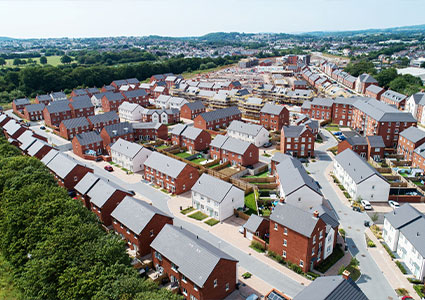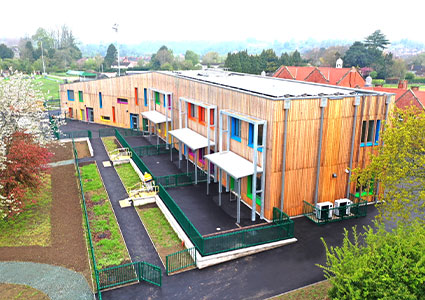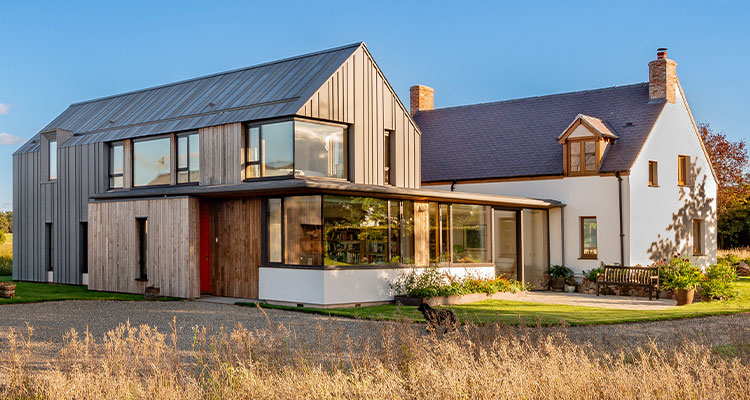Learn how Lowfield Timber Frames promotes sustainability by crafting Passivhaus-ready structures
Lowfield Timber Frames (Lowfield) specialises in providing high-quality, sustainable timber frame solutions for construction projects across the UK. With over 25 years of experience supplying engineered timber products, the company has established a reputation for exceptional service, quality, and excellence in all aspects of its work. Whether serving self-builders, small local contractors, or large regional and national developers, Lowfield takes pride in delivering fully bespoke projects tailored to each client’s unique requirements. The company is also fully equipped to help clients achieve low-energy building standards and is part of some of the UK’s largest Passivhaus schemes. Managing Director, Darren Jarman, joins us for an informative discussion, beginning with a summary of Lowfield’s history.
“Steve Roberts, our group chairman, founded SJ Roberts Construction in 1979. In 2000, he acquired a timber frame business when a local builders’ merchant was diversifying and phasing out the timber frame division. Thus, Steve took on about five of their staff, including the managing director, and began to grow the division slowly. Initially, our focus was on producing timber frames primarily for our sister company, SJ Roberts Construction. Over the years, we have continued to expand, and Lowfield Timber Frames became a stand-alone limited company in 2006, continuing to thrive on the success of SJ Roberts Construction. When I joined the company, we had around six employees, while today we boast more than 130 staff members. Last year, we achieved a turnover of just over £20 million, and with the current market conditions, we anticipate the potential for a 50 per cent increase this year,” he opens.
diversifying and phasing out the timber frame division. Thus, Steve took on about five of their staff, including the managing director, and began to grow the division slowly. Initially, our focus was on producing timber frames primarily for our sister company, SJ Roberts Construction. Over the years, we have continued to expand, and Lowfield Timber Frames became a stand-alone limited company in 2006, continuing to thrive on the success of SJ Roberts Construction. When I joined the company, we had around six employees, while today we boast more than 130 staff members. Last year, we achieved a turnover of just over £20 million, and with the current market conditions, we anticipate the potential for a 50 per cent increase this year,” he opens.
Passivhaus principles
Still centred in the timber framing sector, over the years Lowfield has adapted to changing industry needs, prompting the diversification of its services. “Since our early days in timber framing and timber frame panels, our facilities have expanded significantly. The evolution of thermal performance has massively influenced the development of our product range. At first, we manufactured relatively small open timber frame panels, sending out loose joists and floor decking, which was enough for the market’s needs at that time. However, as we have evolved, both thermal performance and site efficiency have improved. Consequently, our standard panels have got bigger, and all components are now crane-erected on site. To make the most of the cranes on site, we deliver our floors as floor cassettes, and we also provide roof cassettes.
“In addition to these innovations, we incorporate glued laminated timber (glulam) and oak elements to complement our builds. This is achieved with our recent investment in a Hundegger ROBOT-Compact CNC saw, which can process timber up to 300 millimetres by 650 millimetres. With our in-house transport capabilities, we manage all our own haulage, ensuring control over deliveries. This is especially important when working to tight schedules, as timely delivery is essential for keeping cranes operating efficiently on site. As local authorities increasingly focus on achieving net-zero targets and reducing embodied carbon, there is a growing interest in low-impact insulations like wood fibre and cellulose. As a result, our wall thicknesses are expanding again, and we are now producing twin walls that are approximately 400 millimetres thick. While we have experience in modular construction, we believe that this is not the future direction for the industry and see more value in our panel systems,” Darren adds.
With sustainability at its core, Lowfield is proud to be a member of Passivhaus Trust and has a certified in-house Passivhaus designer, driving its growth in sustainable construction. “Our Passivhaus designer, James Roberts, is an architectural technologist. Shortly after joining us, he completed the Passivhaus designer course, leading to our membership in the Passivhaus Trust, where we actively support their initiatives. Recently, we participated in a series they produced on how to build to Passivhaus standard. While we do not handle the design in-house, we provide valuable support to our clients. For example, many self-builders approach  us with aspirations to achieve Passivhaus standards, often believing it is beyond their reach. However, by guiding them through the options available to them, we can help achieve their goals. On the other hand, some clients want to follow Passivhaus principles but may only focus on select elements, which unfortunately does not work. For instance, they might opt for excellent air tightness and thermal performance without considering orientation or form factor. This can sometimes hinder their success, but we strive to offer open and honest feedback on how to best improve their designs,” says Darren.
us with aspirations to achieve Passivhaus standards, often believing it is beyond their reach. However, by guiding them through the options available to them, we can help achieve their goals. On the other hand, some clients want to follow Passivhaus principles but may only focus on select elements, which unfortunately does not work. For instance, they might opt for excellent air tightness and thermal performance without considering orientation or form factor. This can sometimes hinder their success, but we strive to offer open and honest feedback on how to best improve their designs,” says Darren.
Project recognition
As Lowfield continues to champion sustainable practices like Passivhaus design, its commitment to delivering high-quality projects is reflected in its recent nominations. “This year, we have three projects nominated for eight awards at the Structural Timber Awards, showcasing the diversity of our work. On one end of the spectrum, we have Doone Brae Farm, which is up for both Private Housing Project of the Year and Custom Self-Build Project of the Year. On the other hand, Orchard Grove Primary School was nominated for Educational Project of the Year and Low Energy Project of the Year. While these projects deserve recognition, it is important to highlight our larger-scale initiatives, which are our bread and butter. For instance, we recently completed a project involving 100 social housing units in just over 12 weeks. Similarly, we delivered 80 luxury lodges within an 18-month timeframe in collaboration with SJ Roberts Construction. With around 30 projects underway at any given time, we contribute significantly to the industry. In terms of our social housing targets, we are delivering over 2000 homes per year. We believe this focus on larger projects is just as important as the one-off self-builds and educational schemes,” Darren concludes.
By emphasising high-quality service and Passivhaus principles, Lowfield solidifies its reputation as a timber frame industry leader.
